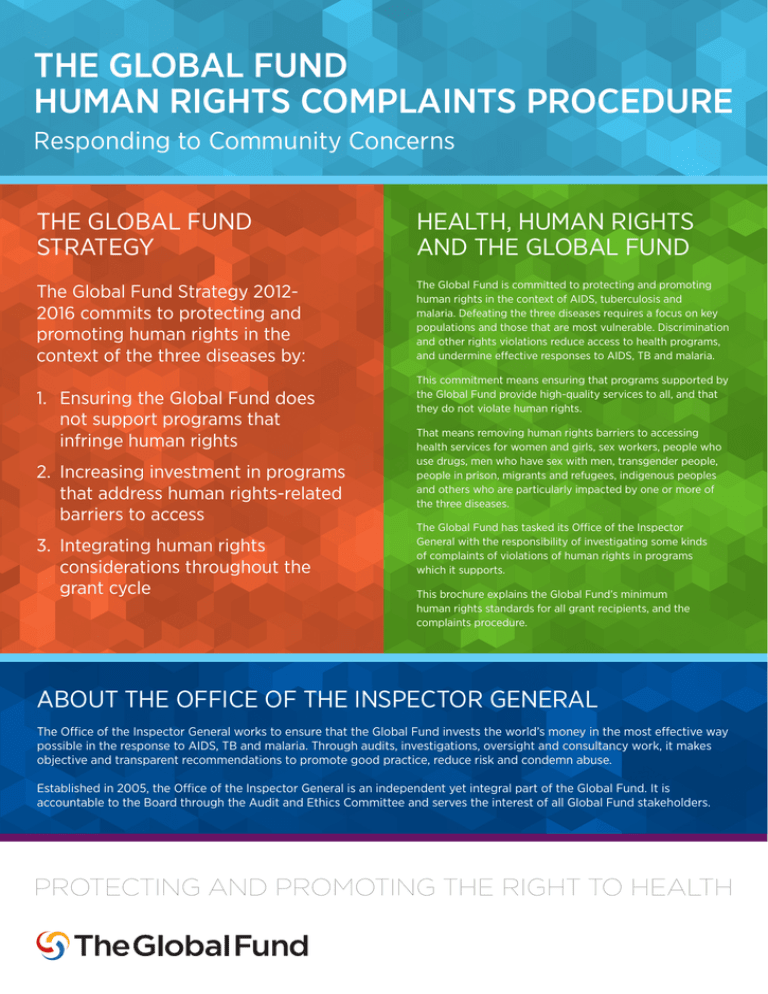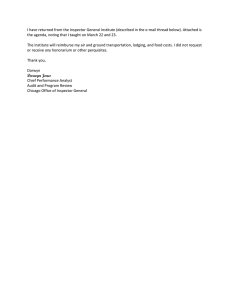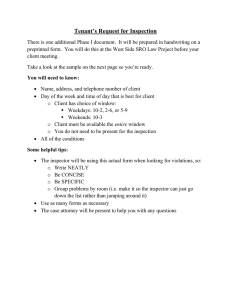brochure - Global Fund
advertisement

THE GLOBAL FUND HUMAN RIGHTS COMPLAINTS PROCEDURE Responding to Community Concerns THE GLOBAL FUND STRATEGY HEALTH, HUMAN RIGHTS AND THE GLOBAL FUND The Global Fund Strategy 20122016 commits to protecting and promoting human rights in the context of the three diseases by: The Global Fund is committed to protecting and promoting human rights in the context of AIDS, tuberculosis and malaria. Defeating the three diseases requires a focus on key populations and those that are most vulnerable. Discrimination and other rights violations reduce access to health programs, and undermine effective responses to AIDS, TB and malaria. 1. Ensuring the Global Fund does not support programs that infringe human rights 2. Increasing investment in programs that address human rights-related barriers to access 3. Integrating human rights considerations throughout the grant cycle This commitment means ensuring that programs supported by the Global Fund provide high-quality services to all, and that they do not violate human rights. That means removing human rights barriers to accessing health services for women and girls, sex workers, people who use drugs, men who have sex with men, transgender people, people in prison, migrants and refugees, indigenous peoples and others who are particularly impacted by one or more of the three diseases. The Global Fund has tasked its Office of the Inspector General with the responsibility of investigating some kinds of complaints of violations of human rights in programs which it supports. This brochure explains the Global Fund’s minimum human rights standards for all grant recipients, and the complaints procedure. ABOUT THE OFFICE OF THE INSPECTOR GENERAL The Office of the Inspector General works to ensure that the Global Fund invests the world’s money in the most effective way possible in the response to AIDS, TB and malaria. Through audits, investigations, oversight and consultancy work, it makes objective and transparent recommendations to promote good practice, reduce risk and condemn abuse. Established in 2005, the Office of the Inspector General is an independent yet integral part of the Global Fund. It is accountable to the Board through the Audit and Ethics Committee and serves the interest of all Global Fund stakeholders. PROTECTING AND PROMOTING THE RIGHT TO HEALTH WHAT ARE THE MINIMUM HUMAN RIGHTS STANDARDS FOR PROGRAMS SUPPORTED BY THE GLOBAL FUND? Five minimum human rights standards are now part of to the Global Fund’s grant agreement, establishing the Global Fund’s expectations for all the programs it supports. Under the grant agreement, Global Fund grant recipients are required to let the Global Fund know if there is a risk that programs may violate any of the standards, and may be asked to work with the Global Fund and address the risks with specific actions. STANDARD 1 Programs financed by the Global Fund are expected to grant nondiscriminatory access to services for all, including people in detention. Discrimination – whether intentional or unintentional – is: unjustified, differential treatment of individuals and groups based on prejudice, ignorance, fear or stereotypes. Services and programs financed by the Global Fund must be accessible without discrimination. An example of respect for Standard 1: A man who seeks an HIV test tells the health care worker that he sometimes has sex with other men. The health care worker continues to treat the client politely and with respect. A potential violation of Standard 1: A man who seeks an HIV test is refused a test by the doctor because the man has sex with men and “You will only bring us trouble.” A TB patient is refused treatment. She is told by a health care worker that she will not be able to adhere to treatment because she is a member of an “unreliable” minority group. STANDARD 2 Programs supported by the Global Fund are expected to employ only scientifically sound and approved medicines or medical practices. Medicines, therapeutic procedures and treatments are generally subjected to extensive testing to ensure their safety and effectiveness. The Global Fund has a comprehensive quality assurance policy for pharmaceutical products that includes clinical and quality standards for the procurement of medicines with grant funds. These and the medical practices financed by the Global Fund are based on recommendations and standard treatment guidelines from the World Health Organization (WHO). An example of respect for Standard 2: A Global Fund-supported program provides all clients with quality-assured medicines and treatment in line with national treatment guidelines and/or WHO standard treatment guidelines. A potential violation of Standard 2: Rural villagers are given an experimental treatment for malaria by Global Fund-supported health care workers, but are not told that the treatment has never been approved by either the national regulatory drug authority or WHO. STANDARD 3 Programs financed by the Global Fund are expected to not employ methods that constitute torture or that are cruel, inhuman or degrading. As defined in international law, torture is any form of intentional abuse, caused by or with the consent of a state official, that causes severe mental or physical suffering for a specific improper purpose (for instance, to extract information or a confession). Where there is not an improper purpose for the abusive treatment, it is not torture. But it can still be cruel and inhuman treatment if it causes severe suffering. It may be unintentional or it could simply be caused by negligence. Degrading treatment is abuse that inflicts suffering and aims to humiliate a person. Services and programs financed by the Global Fund should help, not harm, the people they serve. All people deserve to be treated with dignity and respect. An example of respect for Standard 3: A detention center gives all detainees who need it access to Global Fund-financed HIV, TB and malaria treatment. A potential violation of Standard 3: A detention center withholds Global Fund-financed treatment from some detainees as punishment for breaking the rules. STANDARD 4 STANDARD 5 Programs supported by the Global Fund are expected to respect and protect informed consent, confidentiality and the right to privacy concerning medical testing, treatment or health services rendered. Programs financed by the Global Fund are expected to avoid medical detention and involuntary isolation, which are to be used only as a last resort. Informed consent is the process by which a health care provider gives information to a patient so that the patient can make a voluntary choice to accept or refuse a test or treatment freely, without undue pressure. Privacy refers to an individual’s right to be free from intrusion or interference by others. Confidentiality refers to the obligation of an organization to protect personal information from unauthorized access, use or disclosure. Global Fund-supported programs must respect informed consent, confidentiality and privacy. This is to ensure that people will come forward for testing and treatment and remain in care, and in order to protect clients from stigma, discrimination and violence. An example of respect for Standard 4: A health care worker patiently and clearly explains the benefits and risks of a medical procedure, so that the client can decide whether or not to have the procedure. A potential violation of Standard 4: A health care worker tests a woman for HIV. Without the woman’s consent, the health care worker tells the woman’s husband that she tested positive. Detention and isolation are extreme measures that are rarely used to contain epidemics. Drug-resistant tuberculosis poses a challenge because a patient who refuses treatment can be a danger to other people with whom they come into contact. WHO says that all patients should have access to highquality TB diagnosis and treatment. All voluntary measures should be pursued first. Medical detention should only be used as a last resort if a patient wilfully refuses treatment and risks transmitting the illness to others. Even then, medical detention should be as minimally restrictive as possible, allowing people as much as possible to lead normal lives. An example of respect for Standard 5: A health care worker talks with a TB patient, offering him choices about who will observe his treatment, and explaining that if the patient misses appointments, a health care worker will check in by phone or in person. A potential violation of Standard 5: A TB patient is detained without any attempt to use less intrusive means to ensure he is following his treatment. WHO CAN FILE A COMPLAINT? If someone believes that they have either experienced or witnessed a violation of any of these five human rights standards in a Global Fund-supported program, he or she can file a complaint with the Global Fund’s Office of the Inspector General. An organization may file a complaint on behalf of an individual or group that is directly affected, provided that it has a letter of authorization. The identity of the person making the complaint will remain strictly confidential, unless he or she provides consent for his/her information to be disclosed. Anyone reporting a violation may choose to remain anonymous. HOW DOES THE COMPLAINTS PROCESS WORK? FILING A COMPLAINT ABOUT A HUMAN RIGHTS VIOLATION When the Office of the Inspector General receives a complaint, it will respond within 48 hours. The information in the complaint will be carefully assessed to identify the seriousness of the allegations, and whether to conduct an investigation. The aim of the process is to ensure better access to services, better quality services, and accountability. The Global Fund welcomes information that will enable action to improve services. Complaints are investigated following the procedures of the Office of the Inspector General, which may include conducting witness interviews, collecting relevant documentation and other evidence, and discussing activities with partner agencies, where appropriate. Unless the person who filed the complaint has indicated otherwise, the individual’s identity will remain confidential. The investigation process will follow established timelines in keeping with the Office of the Inspector General’s Stakeholder Engagement Model for Investigations, available at http://www. theglobalfund.org/en/oig/communications/ stakeholders/ All full investigation reports are published on the Global Fund website in line with the Policy for Disclosure of Reports Issued by the Inspector General and in the interests of transparency and accountability. The person who filed the original complaint will also be updated on the outcome. If it is determined that a complaint should be investigated but it is not feasible for the Office of the Inspector General to do so, for logistical or security reasons, the Inspector General can decide, with the consent of the complainant, to share the information with relevant United Nations human rights bodies. Reports of alleged violations should be as specific and as complete as possible, including, for example, the following information: 1. the type of wrongdoing being reported 2. where and when it took place HOW TO FILE A COMPLAINT 3. what happened TELEPHONE (FREE REPORTING SERVICE) 5.the name of anyone else who is aware of what happened +1 704 541 6918 6. why the incident should be investigated BY EMAIL inspectorgeneral@theglobalfund.org ONLINE theglobalfund.org/en/oig/reportfraudabuse/ 4. the name, title and office of everyone involved 7. any other relevant information Complainants should only be encouraged to share this information if they can do so without putting themselves in danger. Please note that the alleged human rights violations by other agencies that are not Global Fund implementers cannot be investigated by the Global Fund’s Office of the Inspector General. To report stock-outs, concerns about Country Coordinating Mechanisms, issues in selection of grant recipients, or other concerns, please contact the Fund Portfolio Manager for the country through this website: http://portfolio. theglobalfund.org/en/Home/Index PROTECTING AND PROMOTING THE RIGHT TO HEALTH



